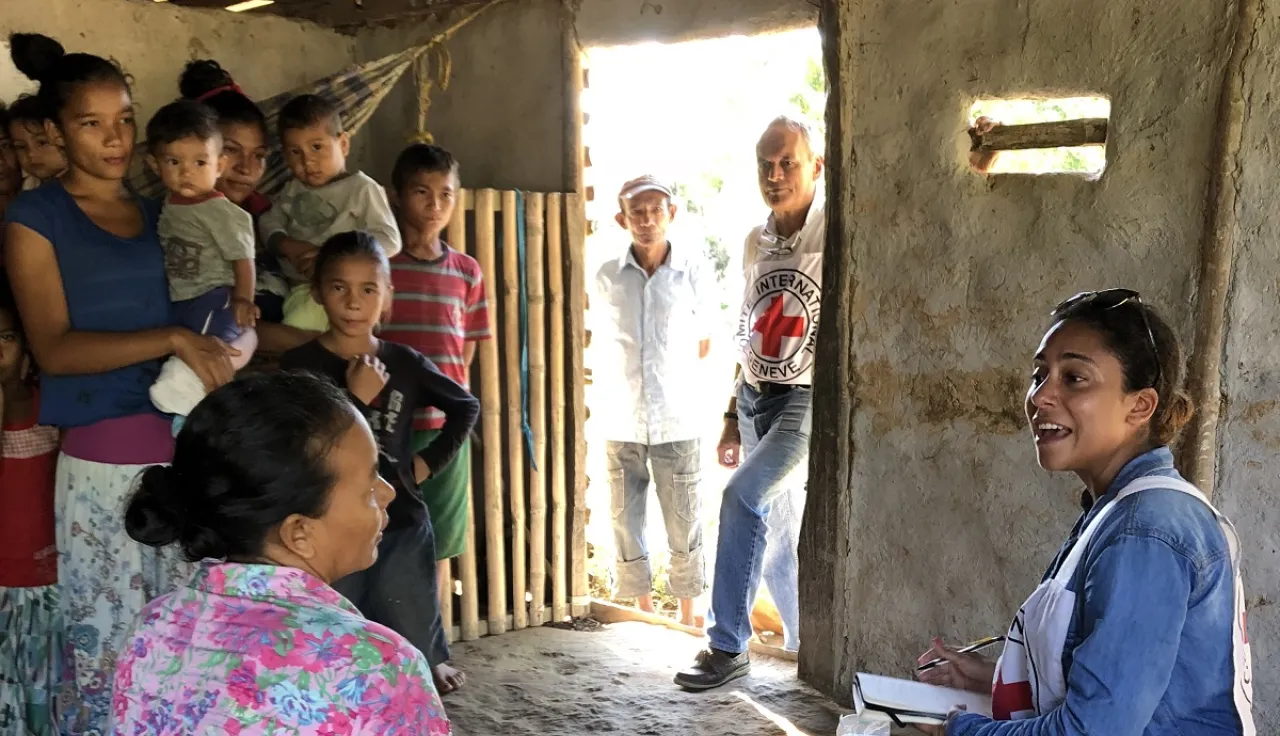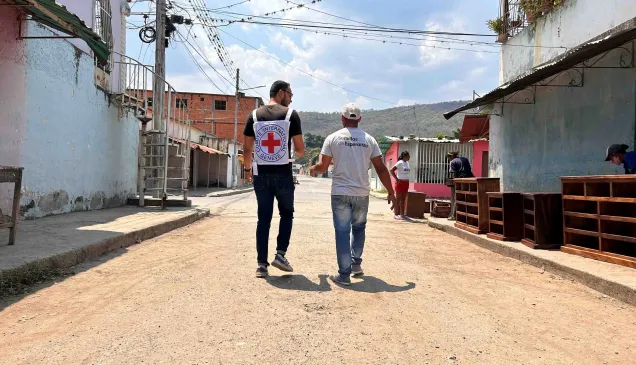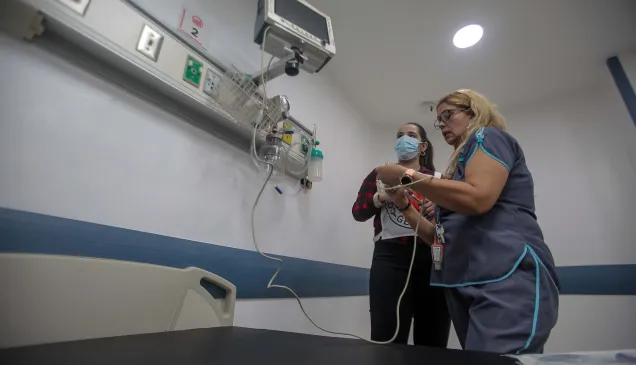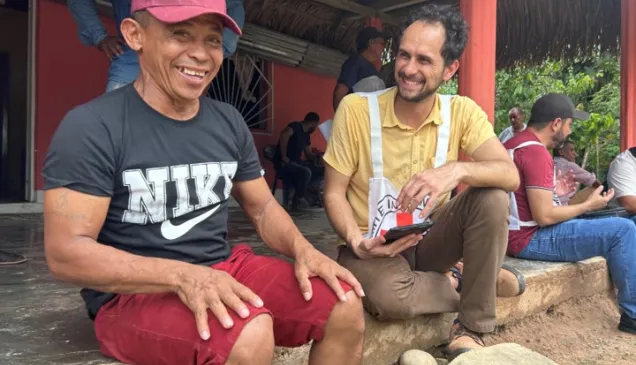Q&A: Humanitarian situation in Venezuela

Q&A with Sophie Orr, regional director, Americas, on Venezuela.
Q. What is the humanitarian situation in Venezuela?
The situation has been complex for many months due to a multitude of factors: economic crisis, social protests, deteriorating basic services, migration flows and high levels of violence. Since January, the renewed political crisis and increasing violence have also added to this toll, putting in jeopardy already fragile coping mechanisms and people's limited resources. Challenges to maintain the health system up and running and to repair infrastructures, for instance, are having an impact on the most vulnerable and the population at large.
As a result, people continue to leave the country. Often, the breadwinner leaves the family behind, taking an uncertain and dangerous path in the hope of finding a way to make ends meet, be it in Venezuela border areas or in neighboring countries. Those who stay behind need a lot of support. Children drop out of school because mothers can't feed them, or simply because the teachers have left. Sometimes they head to the streets in a desperate move to survive, exposing themselves to the worst situations.
Q. What are your activities in the country?
This year we are increasing our assistance to those in need, particularly in the areas of health and sanitation. In fact we are more than doubling our budget, from about 9 million Swiss francs to CHF 19 million.
We will continue training health staff in emergency care, donating hospital equipment, and rehabilitating health public facilities. We are hoping to visit places of detention to bring support to the detainees and the penitentiary authorities. Working to help maintain basic public services together with public institutions, in a non-political way, is vital to ensure that the most affected are assisted and that the population in general has access to them as and when they need.
Last year we supported several hospitals by providing medical supplies, improving their emergency services, training their staff and assisting with an updating of protocols. We took care of thousands of sick and weapon-wounded people and carried out first-aid training to first responders.
In terms of the continued migration, we will also offer support to the most vulnerable migrants during their journey, to those who have moved to neighbouring countries and to the families who stayed behind in Venezuela.
We will also continue our work with and our support to the Venezuelan Red Cross and with different partners from the civil society.
Q. What is your position regarding the aid distribution proposed for Venezuela? Will the ICRC participate?
It is important that more aid reaches Venezuelan people in need. This is why the ICRC is increasing its humanitarian response in the country. Our only concern is to ensure that the most affected people are assisted and in the best possible way.
We are ready to bring humanitarian aid to Venezuela provided that all stakeholders agree on the ICRC's and the Red Cross' role, that it is strictly based on needs and delivered to all those who need it with strict impartiality. We will continue to work through our usual channels to bring assistance according to our principles of neutrality, impartiality and independence. We will not enter into political discussions.
As we know from experience working in different and highly complex locations, the ICRC´s posture of neutrality pays off, as it enables our teams in the field to access affected populations and respond to their needs whilst reminding all stakeholders that this is the priority.
Q. With whom do you have a dialogue in Venezuela?
As it is the case everywhere the ICRC works, we are in contact with all key stakeholders, to make sure we build an enabling environment to carry out our humanitarian action. In Venezuela, we have met with all concerned actors.
Q. Do you face any constraints to carry out your humanitarian action in the country?
We have been present in Venezuela since 1966 and we are currently able to carry out our activities. We are bringing the necessary assistance and this year we are doubling our response, including an increase in ICRC staff. We are present on the ground and have unrestricted access to the places we have identified in order to deliver our humanitarian response. We would like to see this access extended to places of detention in the country and we hope this will happen soon.
Wherever we work, it is always important that humanitarian organizations be granted unrestricted access to the populations in need.
Q. Is there a migration crisis in South America?
The situation in Venezuela has led to over three million migrants, according to UN figures. Beyond numbers, the ICRC is concerned about the vulnerability of these migrants. A person or family with few resources making a long trip on foot often needs a lot of support.
We´re particularly concerned about the situations of migrants crossing the border with Colombia through irregular routes. The presence of armed groups means that migrants might face extortion, threats, violence or forced recruitment. Women and unaccompanied minors are particularly vulnerable, with sexual violence a real danger.
In Venezuela, some children are left behind under the care of elderly family members, or simply left in a highly vulnerable situation. The exodus is also affecting local capacities in all the sectors – teachers, doctors, social workers and even Red Cross volunteers have left the country – which in turn aggravates the situation and hampers the possibility of a prompt recovery.
This year, we are increasing our response in Colombia by CHF 6.4 million to enable access to medical services, mental health and psychosocial support, and physical rehabilitation for migrants. Last year, more than 100,000 Venezuelan migrants were able to talk to their families through the phone calls provided by the ICRC in Colombia, Ecuador and Brazil. We also provided water and sanitation, restructured some shelters and donated medicines to hospitals on the border with Colombia. In Venezuela, the ICRC provided support in the return of deceased Venezuelans to their families, and helped reunifying families. It also set up family contact services in 5 different points along the way.
More on Venezuela:



